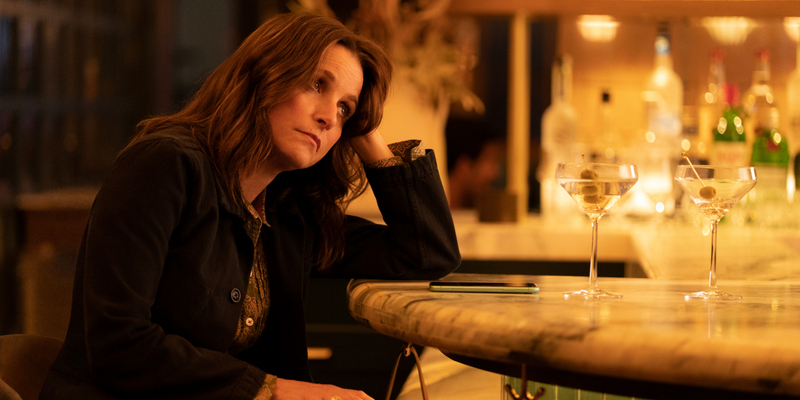
Review by
Eric Hillis
Directed by: Nicole Holofcener
Starring: Julia Louis-Dreyfus, Tobias Menzies, Michaela Watkins, Arian Moayed,
Jeannie Berlin

Writer/director Nicole Holofcener has long been compared to
Woody Allen, on whose 1970s and '80s films she worked in various
capacities (her parents being Allen collaborators set decorator Carol
Joffe and producer Charles H. Joffe). Holofcener's latest,
You Hurt My Feelings, might be her most Allen-esque, with its Upper West Side, middle class
WASP and Jewish intellectual milieu. That's not to say it's classic
Allen but rather it shares similar rhythms to the style of filmmaking
Allen has largely adopted over the last 25 years or so: it has a central
narrative line on which it hangs various brief episodic asides. I've
found this frustrating in many of Allen's recent films, which often play
like he's trying to cram as many of his previously unproduced stories
into a single film as possible, resulting in movies that are overstuffed
with barely realised characters and half-baked scenarios (it's no
surprise that Allen's best movies of the past decade are
Irrational Man
and
Blue Jasmine, two movies that maintain their focus on one central character).
Holofcener does something similar here, with a central theme and
narrative accompanied by a few secondary subplots, but in this case the
latter never distract from the former.

The central plot revolves around Beth (Julia Louis-Dreyfus), a
novelist and writing professor who previously published a somewhat
successful memoir but is struggling to sell her latest work of fiction.
Her husband Don (Tobias Menzies) is a therapist. His job is to
tell people not what they want to hear but rather what they need to
hear. When it comes to his wife's professional insecurities he dismisses
such an approach. He tells her he loves her writing in the way husbands
always tell their wives they look perfect in every dress.
When Beth stumbles upon Don in a department store and overhears his
conversation with a friend, she learns the brutal truth. It turns out
Don has been lying about her latest work, which he doesn't care for at
all. Beth views this as a betrayal, and it drives an instant wedge
between the couple.

With this theme Holofcener pushes back against the very modern notion
that the worst thing you can do is cause offence. The old maxim of
"sometimes you have to be cruel to be kind" has lately been tossed aside
in favour of an "everyone gets a medal" mentality that might be
well-meaning but is ultimately counter-productive, breeding generations
of self-entitled people who find themselves shocked to realise the real
world doesn't consider them special. In one scene Beth's son (Owen Teague) lays out how his mother damaged him as a child by always telling him
he was brilliant at tasks at which he was really mediocre. Don's defence
relies on claiming that he didn't want to discourage his wife's writing.
This leads to an amusing standoff where the couple comes clean about how
much they hate the gifts they've bought each other over the years.
Other subplots involve Beth's interior decorator sister Sarah's (a
charismatic Michael Watkins) attempts to find a light fixture
that meets the approval of a fussy client; Sarah's actor husband Mark's
(Arian Moayed) own professional doubts; the sisters' relationship
with their cantankerous mother (the always delightful
Jeannie Berlin); and Don's struggles with an estranged couple
(real life couple Amber Tamblyn and David Cross). Rather
than detracting from the central drama, these asides give it room to
breathe and serve to remind us, if not Beth, that everyone has their own
issues to deal with.

Holofcener also seems to be using this film to strike back against the
current idea that first world problems can't be worthy of a viewer or
reader's attention. Like Lara Flynn Boyle's writer in Todd Solondz's
Happiness, Beth bemoans how her father's abuse was verbal rather than physical,
which might have given her memoirs some commercial sensation. "Verbal
abuse can be awful," her agent reassures her. Coming from a similar
background to her characters, Holofcener writes about people and
situations she's familiar with, which is what every writing teacher
tells their students. It's not a writer's job to appeal to an audience's
desire for broad sensation, it's up to the audience member to find
common ground in stories that play out in unfamiliar and alien settings.
While it might be easy to look at Beth's unfeasibly large apartment and
think she has nothing to worry about, you don't have to live in upper
Manhattan to relate to self doubt. If you can't find anything worthy in
a movie because it doesn't feature characters that resemble you on the
outside, that's your problem, not the filmmaker's. And do we really want
rich white people making movies about what it might be like to not be
rich and white? There are enough examples of the cringey results of such
endeavours.
Even if you've never had any self-doubt (and if you haven't you should
probably be put on a watch list, because you're clearly a sociopath),
it's impossible not to empathise with Beth. Louis-Dreyfus plays the part
like a wounded animal, and her embodiment of the emotional hurt she's
suddenly engulfed by is akin to a lighter version of seeing Jimmy
Stewart depressed and suicidal at the end of
It's a Wonderful Life. By global standards, Beth really does have a wonderful life, but like
depression, doubt doesn't care about any socio-economic factors.


